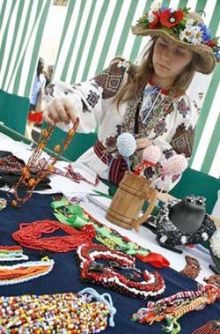TERNOPIL — although the summer is in full swing, the spirit of spring is still in the air, as evidenced by the Ukrainian Spring festival of Ukrainian culture that took place in Poznan toward the end of May.
Although the Ukrainian Spring posters showed bright yellow dandelions against a sky blue background, the Ukrainian festival in Poznan was primarily associated with acacia, especially their strong fragrance as the event coincided with the period of their blossoming, and Poznan teems with these trees.
This Polish city usually hosts a number of cultural events, so impressing its residents is easier said than done. Nevertheless, the organizers of Ukrainian Spring did their best to acquaint them with both modern and traditional Ukrainian culture. The project included literary readings, political debates, sculptural exhibits, and performances by Ukrainian Cossacks who demonstrated old combat skills. Folk craftsmen from various regions of Ukraine displayed their works from wood, clay, needlework, and so on. For a week the Ukrainian groups Drymba da dzyga and Tartak performed at nightclubs and on city squares with their Lao Che Polish colleagues.
Poznan public warmly received the Ukrainian dancers, particularly the Yunist group from Lviv. In fact, festival events took place in the city’s very interesting and important places. Thus, an exhibit of works by the Ukrainian sculptor Boretsky was held at the Archaeological Museum, the rock groups performed in the local castle’s courtyard, and the festival’s guests Bohdan Stupka and Jerzy Hoffman met with their fans in the cozy atmosphere of the caf at the editorial office of the Gazeta Wyborcza.
Doubtlessly, one of the festival’s most interesting events was the screening of Hoffman’s four-episode documentary Ukraine — The Birth of a Nation. The celebrated Polish film director had spent more than four years on the project. Although the film had been ready last year, this was the first public screening.
Too bad; if screened earlier, the residents of Ukraine could have felt more Ukrainian, more dignified. Hoffman says that in order to have dignity, you must know your past, adding that there is nothing surprising about a foreigner making a film dealing with Ukrainian history. Likewise, it was easier for an Englishman than a Pole to write about Polish history. What makes one wonder, however, is not that such a documentary was made by a Pole rather than a Ukrainian; it is the fact that, despite the documentary’s merits and praising comments by critics, it has been watched literally by a handful of people. It has never been screened on a broad scale (on television or in movie theaters) in Poland or Ukraine, and nor is it readily available as a disk which you can play at home.
For some reason, the organizers of a festival are usually mentioned briefly, but in this case this would not suffice. The fact remains that this festival of Ukrainian culture was made possible owing to the Polish side in the first place. I was personally stunned to learn this. True, several Ukrainians did contribute tangibly to the arrangements, yet local Polish enthusiasts played the key role. The biggest credit is, of course, due the cultural NGO Poland-Ukraine and its President Lukasz Gorowski. He is known in Ukraine as an effective manager and philanthropist. In this phase of Ukrainian-Polish relationships he also acts as the Honorary Consul of Ukraine in Poznan. The festival Ukrainian Spring has been held for two years owing to his dedicated effort and, partially, financial aid. This year’s festival turned out on a scale almost twice that of last year. Gorowski says, however, that staging such an event in Poznan isn’t easy, primarily because the local public is very demanding. The municipal budget has a special expense item for precisely this kind of events, because “all declarations are worthless unless backed by money.” According to Oleksandr Motsyk, Ambassador Extraordinary and Plenipotentiary of Ukraine to the Republic of Poland, his embassy helped the arrangements for the festival with professional advice.
However, the festival was mainly helped by volunteers, particularly students and graduates of the Faculty of Russian-Ukrainian Philology at Adam Mickiewicz University and Institute for Eastern Studies. They also largely contributed to the overall atmosphere. After all, meeting people who can speak your language while you are several thousand kilometers from home is extremely heartwarming, it makes you feel almost the way you do at home, surrounded by blossoming acacia trees.








